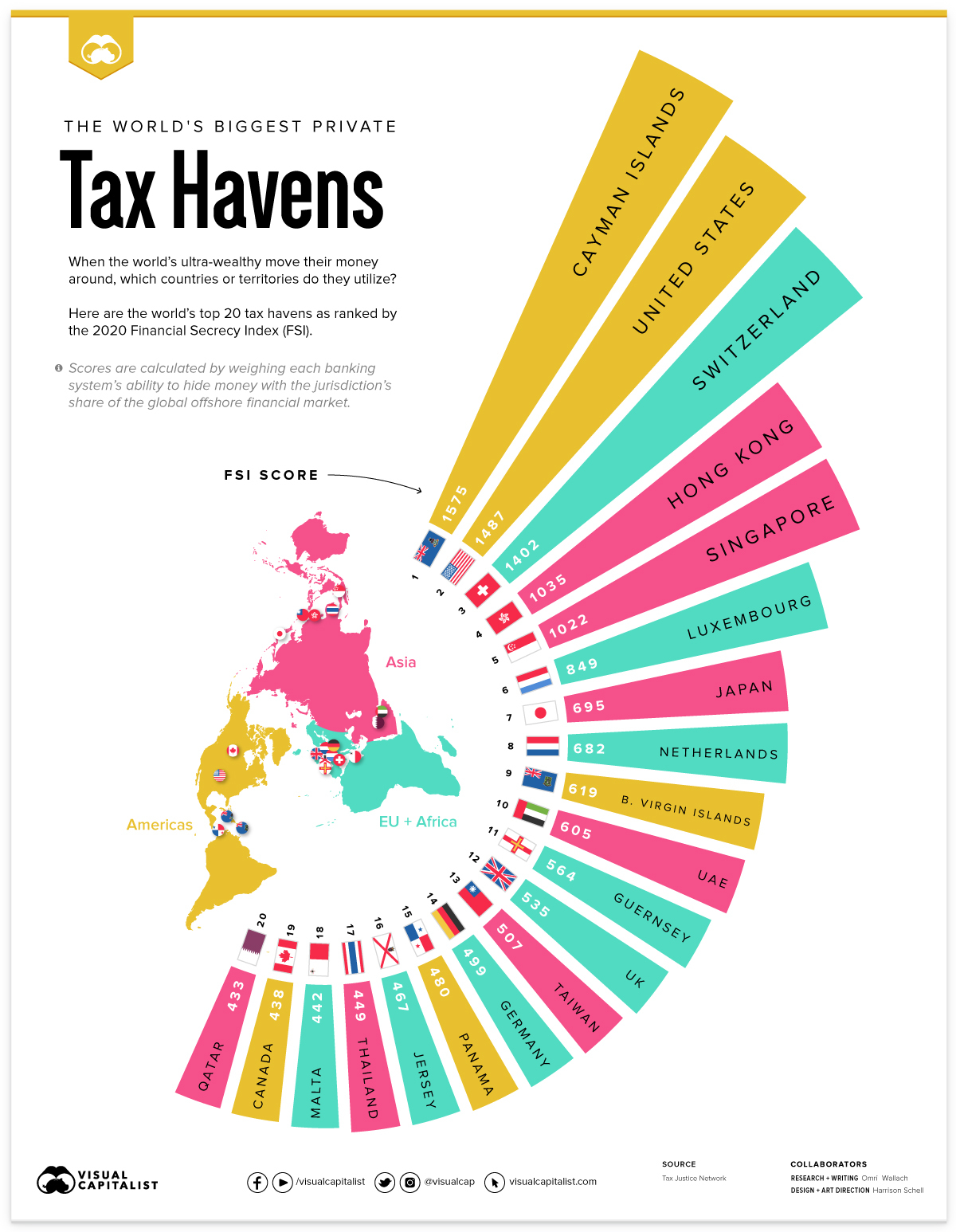
When the world’s ultra-wealthy look for tax havens to shield income and wealth from their domestic governments, where do they turn?
If you’re putting money in offshore bank accounts in order to save on taxes, there are two main criteria you’re looking for: secrecy and accessibility. Based on pop culture and media reports, you might imagine a secretive bank in Switzerland or a tiny island nation in the Caribbean.
And though there is some truth to that logic, the reality is that the world’s biggest tax havens are spread all over the world. Some of them are small nations as expected, but others are major economic powers that might be surprising.
Here are the world’s top 20 tax havens, as ranked by the 2020 Financial Secrecy Index (FSI) by the English NGO Tax Justice Network.
Which Countries are the Biggest Tax Havens?
The FSI ranks countries and territories from all over the world on two criteria: secrecy and scale.
- Secrecy Score: How well the jurisdiction’s banking system can hide money. This includes analysis of ownership registration, legal entity transparency, tax and financial regulations, and cooperation with international standards.
- Global Scale Weight: What is the jurisdiction’s share of the world’s total cross-border financial services? This metric is based primarily on the IMF’s Balance of Payments statistics.
By weighing a country’s ability to hide money by its relative share of offshore financial services, we see the tax havens with the biggest impact on the global economy.
At a glance, the top 20 tax havens are spread out across regions. Just under half of the list is located in Europe, but the rest are spread out across the Americas and Asia.
And the jurisdictions are opposites in many ways. They include financial powerhouses like the U.S., Japan, and the UK as well as smaller nations and territories like the Cayman Islands, Hong Kong, and Luxembourg.
But one surprising thing many of them have in common is a link to England. In addition to the UK, four of the top 20 tax havens—Cayman Islands, British Virgin Islands, Guernsey, and Jersey—are British Overseas Territories or Crown Dependencies.
Also worth noting is the importance of scale in the rankings. The highest ranking jurisdictions by secrecy score were actually the Maldives, Angola and Algeria, but they represent less than 0.1% of total offshore financial services.
Best Place To Hide Private Vs. Corporate Tax
Some of the listed tax havens might be confusing to nationals of those countries, but that’s where relativity is important. The U.S. and Canada might not be tax havens for American or Canadian nationals, but the ultra-wealthy from East Asia and the Middle East are reported to utilize them due to holes in foreign tax laws. Likewise, the UAE has reportedly become a tax haven for Africa’s ultra-wealthy.
In addition, many of the countries used as tax havens for individual wealth are also utilized by corporations.
The Tax Justice Network’s 2021 assessment of corporate tax havens listed the British Virgin Islands, Cayman Islands, and Bermuda as the top three tax corporate tax havens.
While individuals might create shell companies in tax havens to hide their wealth, corporations are usually directly incorporated in the tax haven in order to defer taxes.
But the tax haven landscape might soon shift. The G7 struck a deal in June 2021 to start taxing multinational corporations based on the revenue generated in each country (instead of where the company is based), as well as setting a global minimum tax of 15%. In total, a group of 130 countries have agreed to the deal, including India, China, the UK, and the Cayman Islands.
As the campaign to bring back deferred taxes ramps up, the question becomes one of response. Will the ultra-wealthy individuals and corporations start to work in tandem with the new rules, or discover new workarounds and tax havens?